Wednesday Feb 18, 2026
Wednesday Feb 18, 2026
Thursday, 9 May 2024 00:37 - - {{hitsCtrl.values.hits}}
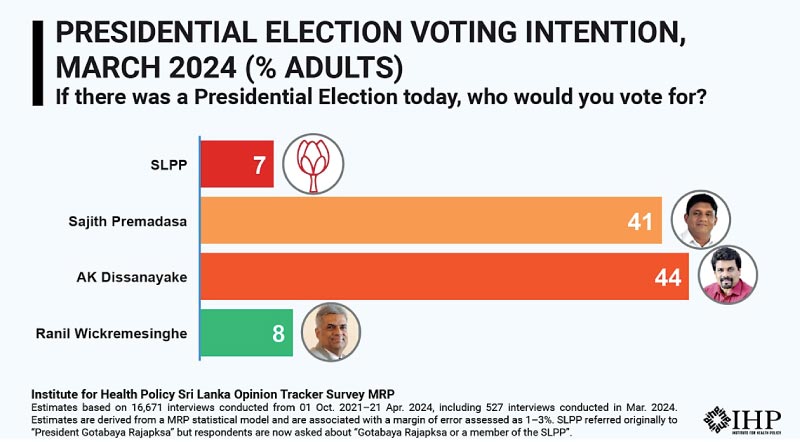
It’s a race!

SJB ahead by a whisker

Anura, NPP May Day Colombo
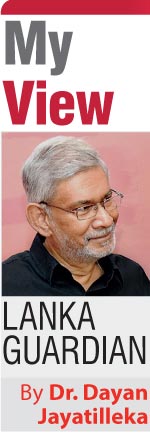 Tyrannical Tiran Alles is about to learn a lesson in politics that his distinguished, respected father would have taught him had he been around. The worst time to play tough guy is in an election year with six months max to go to vote. Citizens (including officials) are impatient to vote, and are unintimidated because they know they have the power to bring the whole power structure down soon, if they so wish.
Tyrannical Tiran Alles is about to learn a lesson in politics that his distinguished, respected father would have taught him had he been around. The worst time to play tough guy is in an election year with six months max to go to vote. Citizens (including officials) are impatient to vote, and are unintimidated because they know they have the power to bring the whole power structure down soon, if they so wish.
The Minister concerned is an unelected parliamentarian whose name has figured in disclosures by whistleblowing international journalists. He is attempting a witch-hunt against an articulate, courageous, mediagenic young man. He has antagonised the socially confident, sophisticated travel industry. Whatever his power (and cross-party connections), he is on a very slippery slope and may start the rockslide that takes the administration down with him.
His arrogant truculence, justifying enmeshing the country for 12 years with VFS, has already lost Ranil some of the votes he had recovered among Colombo’s upper-middle class.
Tiran the Terrible (whose apparatus has yet to crack the Dinesh Schaffter murder) discloses that the major shareholder of VFS is Blackstone. Huh? Isn’t Blackstone one of our major ISB creditors? If so, that would be some coincidence. Ranil’s administration 2015-2019 racks up the colossal ISB debt while Ranil’s administration 2024 parcels out roles and functions of the Sri Lankan state to foreign companies owned by the biggest private bondholders? How many more such moves in the pipeline?
Election uncertain
Addressing his May Day mobilisation, President Ranil Wickremesinghe didn’t say a word about the impending Presidential election and didn’t ask anyone to vote for him. That’s odd.
Instead, over the next several days, Ranil used every occasion to assert that “we shall require 3-4 years more” for economic recovery; “we shall need 2-3 years more to cross the bridge to economic recovery” or variations on that theme. He called for a broad, cross-party coalition to undergird the austerity-for-recovery project. That’s odd too. With a Presidential election five months away, why would any party, led by his competitors who are aspiring to Presidential office, join him in a coalition?
Here’s my hypothesis. Wickremesinghe is aiming to sign agreements with the private bondholders, the IMF and Indian big business, and lock the package in not only with legislation (new labour laws, an ‘Economic Transformation Law’) but by freezing the electoral process in June-July, aborting this year’s Presidential election.
Given the example of the ceaseless carnage and economic havoc of the 1980s which ended thirty years later and stemmed from the December 1982 freeze on the scheduled Parliamentary election of early 1983, one thing is more certain than any other. If the Presidential election scheduled for September-October this year is frozen for any reason, however plausible, we can kiss goodbye to any prospect of economic recovery whatsoever, because we shall be consumed by political and social conflict in its most intense form.
As on-camera ‘live’ You Tuber public opinion polling in crowded market squares reveals, even those who refuse to disclose their electoral preferences declare emphatically that “we need an election quickly!” In the throes of an economic crisis and foreign encroachment, a regime which postpones a national election divests itself of the final flimsy shreds of legitimacy and popular consent. Such a regime cannot prevail in a counterrevolutionary attempt. The revolutionary administration that finally issues from a resistance struggle will be far more radical than any version or vision of the JVP-NPP that the cross-party elite Establishment is currently hysterical about.
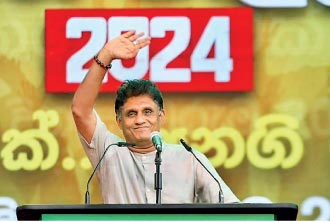 |
| Sajith stands his ground |
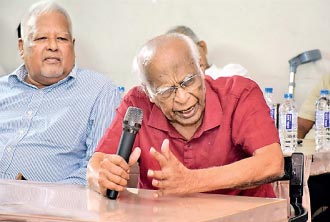 |
| Dew Gunasekara and Sarath Amunugama
|
Reduce Rama’s footprint
One would have thought that the outburst by Sanduru Kumarasinghe, the young man at the Katunayake International Airport and the public opinion firestorm that erupted over allegations of “an Indian officer” --Tiran admits the Vice-President of the company, an Indian, was visiting the airport counter that day for the kick-off -- issuing visas, would have served as an amber light for India. But if the election results in the Maldives did not, then nothing would, I suppose.
Countries, especially islands, tend to be sensitive about issues of perceived encroachments on sovereignty by large, powerful neighbours. If mishandled, public opinion hardens and these neighbouring states, islands or not, metamorphose into hedgehogs.
Just days after the KIA episode, the Indian High Commissioner was seen on TV news at an event in Trincomalee, at which he sang the praises of a land-bridge which was to be built between Sri Lanka and India, and the benefits it would bring the Eastern Province.
Given the sensitivities involved one might have thought India’s top diplomat in Colombo would have avoided the issue of overland connectivity. It is one thing to have a ferry service or flights, but quite another to change millennia-old facts of geographic separation by means of a land-bridge. This contentious idea was not in any manifesto presented by President Wickremesinghe on the basis of which he was elected, because he was never elected to either the Presidency or the parliament. He did advocate a land-bridge between India and Sri Lanka when he was PM in 2015-2019 but he and his party were not elected to a single seat at the election that followed. Certainly, the SLPP that supports him wasn’t elected to build a land-bridge to India.
It is both injudicious for any Indian diplomat or official to refer to the project of a land-bridge which has no legitimacy in the eyes of the Sri Lankan people because no one, starting with India’s main Lankan interlocutor, has obtained a mandate for any such enterprise.
Furthermore, a land-bridge to India would be such a game-changer that it would arguably require a referendum in Sri Lanka.
The point made by the High Commissioner, that the land-bridge would benefit the Eastern Province, only adds fuel to fire. Most Sri Lankans would suspect that far from being beneficial to the island as a whole as well as to most of its citizens, the benefits of the land connectivity with India would only or overwhelmingly benefit those provinces of the island most adjacent to India and in particular Tamil Nadu. These are ‘ethnic kin-provinces’ of Tamil Nadu which will be rendered territorially contiguous by the bridge.
What would be prudent is to shelve all talk and action on this project until elections are held and a legitimate Sri Lankan leader with a clear popular mandate can decide on the matter in consultation with a freshly elected Parliament.
May Day, political balance
Ranil’s popularity is clearly under 10% in two, not just one poll: Verite and IHP. The UNP’s May Day manifestation in Colombo was respectable, not impressive, and was propelled by state patronage. So also, the SLPP (Pohottuwa) May Day.
Ranil just doesn’t have a political party which can go handle the ground game. Many of those who attended the May Day meeting may not even vote for him, let alone canvass votes. If all of them do vote for him, it wouldn’t suffice even for second place.
The same goes for the SLPP. How many SLPP parliamentarians will go door-to-door and ask their voters to opt for their long-time enemy who is implementing economic policies they have reviled for most of their lives?
Even if many SLPP and/or SJB MPs crossover to Ranil, how many votes do they bring with them?
Opinion polls reveal the most unpopular institution in the country as being the parliament. Any political reinforcement of Ranil by defecting MPs is not a reinforcement but a subtraction of legitimacy and popularity.
As the latest IHP polls show, Sajith on 41% remains ahead of his party which is at 38%. Whoever votes for the SJB does so not only because of the UNP factor but mainly because of the Premadasa factor—father and son. Whichever parliamentarians defect from the SJB back to the UNP and Ranil, leave the pro-Premadasa vote behind and would add very little to Ranil’s tally.
There were only two electorally significant mass manifestations on May Day that weren’t fuelled by patronage: the JVP-NPP and the SJB. Unlike Ranil and the UNP or any prospective patchwork of UNP-SLPP-SJB defectors there are only two formations which have a combination of viable presidential candidate and an organisation capable of sustaining an electoral ground-game. That’s AKD-JVP-NPP and Sajith-SJB.
The wild optimism of those who project a Ranil win is reminiscent of UNP, Colombo and Lake House expectations of Sir John’s victory in 1956. Those who wax lyrical about the coalition Ranil is putting together, and the economic recovery under his captaincy, are similar to those who were betting on the UNP’s Hath Havula (7-party) coalition and its ‘Green Revolution’ at the 1970 General Election. In the event, those two elections, 1956 and 1970, exhibited such an anti-UNP landslide (the latter in the rural areas which supposedly benefited from the Green Revolution) that they were dubbed the ‘Silent Revolutions of 1956 and 1970’.
Ranil can ensure a large NPP victory by splitting the centre-right vote. The same can be said of Sajith and the SJB, but as between Ranil and himself, he is clearly the more popular candidate, just as the SJB is the far larger party. Logically, the main candidate and party of the anti-JVP camp should not be the one who withdraws or plays second fiddle to an incumbent faring poorly in opinion polls.
The debate as to whose May Day was more successful, the JVP-NPP’s or the SJB’s, is an exercise in denial by the SJB. All photographs, all footage, all slow-motion videos as well as accelerated TikTok showing movement past a single point, establish that the JVP-NPP’s Colombo manifestation was noticeably larger than the SJB’s, though the SJB’s was large. The JVP-NPP’s march took longer, arrived later; the meeting started later and ended later, because it was larger.
The single fact I found most significant about May Day 2024 was the JVP-NPP’s ability to conduct four mobilisations of which only one (Jaffna) was modest and indoors, while the other three – Colombo, Matara, Anuradhapura--were mass manifestations. Of these, two—Colombo and Matara—were not only very large but went on till past nightfall, simultaneously. To re-state, Colombo and Matara were happening at the same time at night, with huge crowds at both places. A top politician in Matara (ex-SLFP/SLPP) told me it was the biggest May Day rally, indeed the largest mass political gathering he had ever seen in his home base in his many decades in politics.
The Colombo-Matara parallel mobilisation is unprecedented. Nobody has done that in Sri Lanka before because there’s been no one who could. Until now. This says as much about the situation as about the players. Things are so bad for so many people--a vast majority-- that they have flocked in unprecedented numbers to the political party (JVP), the Movement (NPP) and the leadership (AKD) that have positioned themselves closer and are perceived because of their socially organic character as more receptive to their pain. “They come from among us, are our university-educated sons and daughters, brothers and sisters, and can therefore understand our pain better. They will fight harder for us and work more determinedly to end our suffering” is the collective sentiment.
Today the “voice of the voiceless millions” (Ranasinghe Premadasa, Oct 1988) is not so much the SJB which does not aspire to that vocation and has chosen to the voice of “the economy” instead. It is more the JVP-NPP. Premadasa was a populist-developmentalist but the SJB’s economic platform has been purged of any trace of populism and is the agency of elitist economic orthodoxy. The economy doesn’t vote. The people do. But they vote according to the pain or rewards the economy brings them.
Going by the new IHP poll, the SJB on 38% is ahead of the JVP-NPP on 35% by a nose. However, an election is a battle, and the best ‘army’, the most disciplined and conscious, with the best ‘commanders’ (watch the closing speakers at Colombo, Matara and Anuradhapura--Anura, Tilvin and Vijitha), is the JVP-NPP. The SJB commanders are from the Mustangs’ tent.
Anura Dissanayake pledges the dissolution of Parliament as the first act if he wins, something he will do that very night. The people regard an AKD win as the surest short-cut to a Parliamentary election which gives them the chance to ‘throw the rascals out’. Anura seems more likely to nominate fresh faces while Sajith’s SJB contains far too many second or third generation members of the old provincial political clans.
Interventionist evening
Last week saw the launch of INTERVENTIONS, an anthology of my Selected Political Writings, edited by Uditha Devapriya and Uthpala Wijesuriya with a Foreword by Kamaya Jayatissa, published by Neptune. The launch at MARGA Institute had a forum featuring a panel (Kusum Wijetilleke, Natasha Gooneratne, Uditha, Uthpala and myself) and a generationally diverse, knowledgeable and articulate audience of 50 invitees.
Soon there was a very civilised but intense free-wheeling debate, a frank outpouring of political opinions. Guests stayed on for refreshments, with tables at the canteen downstairs turning into discussion corners. As a panellist mused, the two-hour event could have easily gone on for another two. But what animated, indeed agitated, the audience drawn from three generations of the modern Lankan, mostly Colombo-based, cosmopolitan intelligentsia?
At its most commonplace, it was a matter of pro-NPP-orientation/sympathies vs pro-SJB-orientation/sympathies, i.e., a debate between those who were more inclined to give one side rather than the other the benefit of the doubt.
But the discussion soon revealed itself as something else: the collective angst of those who are broadly speaking, centre-left (as was the bulk of the audience), who feel their concerns are left out of the national political contest for the first time ever.
Yet even this was not the deepest cause of the evening’s debate. It was the crisis and the inadequacy of the dominant political responses.
Appropriately, it was Dew Gunasekara, respected leftist veteran, who concluded the evening’s discussion coupling it with the overarching crisis which dwarfs the political players. He passionately emphasised the following:
 As tracked by the UNDP and confirmed by the World Bank, the top 1% enjoyed 31% of the wealth, while the bottom 50% had barely 4% of the wealth. This structural situation was the worst ever in independent Sri Lanka.
As tracked by the UNDP and confirmed by the World Bank, the top 1% enjoyed 31% of the wealth, while the bottom 50% had barely 4% of the wealth. This structural situation was the worst ever in independent Sri Lanka.
 The crisis could be resolved only by an economic policy that was centre-left in paradigm and program, but neither SJB nor JVP-NPP were occupying that centre-left space, nor reaching out to the centre-left element. The JVP-NPP wasn’t unifying the Left either.
The crisis could be resolved only by an economic policy that was centre-left in paradigm and program, but neither SJB nor JVP-NPP were occupying that centre-left space, nor reaching out to the centre-left element. The JVP-NPP wasn’t unifying the Left either.
 Whoever wins the Presidential and parliamentary elections will be unable to successfully address the crisis because they will not get the kind of majority, i.e., the support of over half of the citizens, which requires persuading and accommodating centrist opinion.
Whoever wins the Presidential and parliamentary elections will be unable to successfully address the crisis because they will not get the kind of majority, i.e., the support of over half of the citizens, which requires persuading and accommodating centrist opinion.
 The global situation was changing rapidly (as elaborated by Dr. Sarath Amunugama earlier), and a grasp of the international was imperative in resolving the national crisis (as Lenin had stressed in 1917). Neither political camp displayed such a grasp.
The global situation was changing rapidly (as elaborated by Dr. Sarath Amunugama earlier), and a grasp of the international was imperative in resolving the national crisis (as Lenin had stressed in 1917). Neither political camp displayed such a grasp.
The evening’s effervescence was evidence of catharsis.
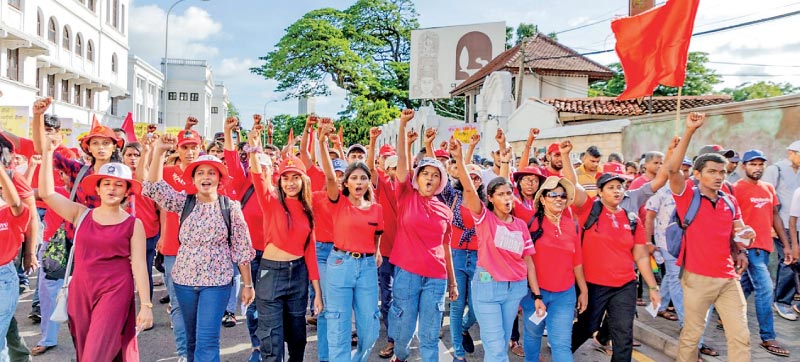
NPP May Day, Colombo
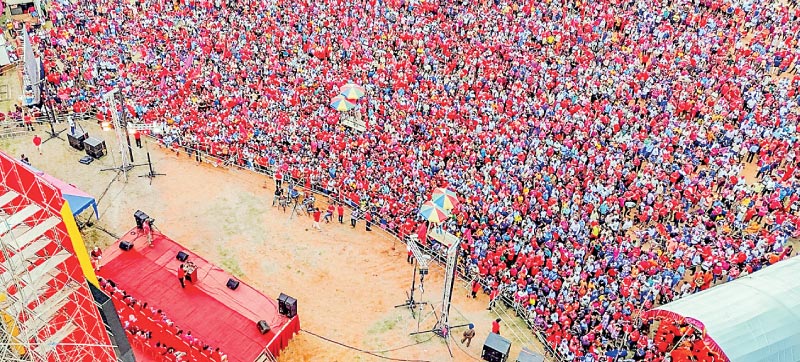
NPP May Day Anuradhapura
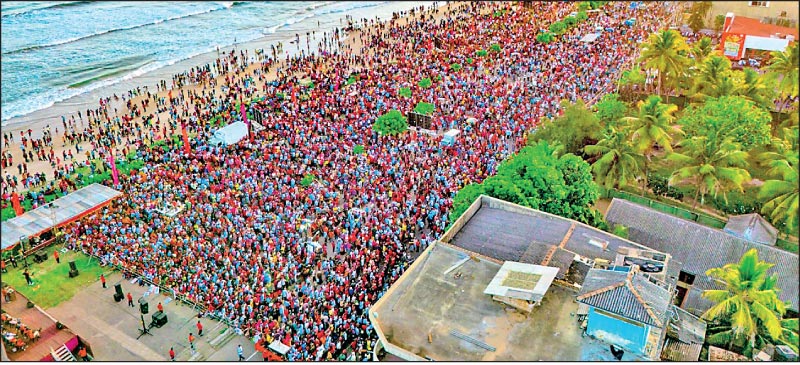
NPP May Day Matara